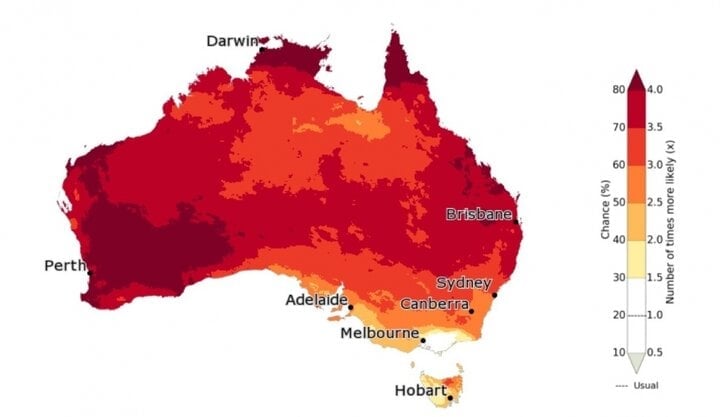According to the Australian Bureau of Meteorology's Deputy President of Science, Andrew Pershing, the world has just experienced the hottest 12-month period in the past 125,000 years, with the global average temperature rising more than 1.3 degrees Celsius between November 2022 and the end of October this year.
Data analysis by Australian scientists and the International Meteorological Union shows that human-caused climate change has significantly increased temperatures around the world .
A research report by the National Oceanic and Atmospheric Administration (NOAA) also emphasized that the intensity of El Nino is gradually increasing and 2024 is forecast to be the most severe year ever, with an unprecedented hot and dry summer.
The El Nino in the Pacific Ocean is expected to peak in the coming months and be one of the strongest on record, scientists said, causing average temperatures to rise by more than 2 degrees Celsius in many places between November 2023 and January 2024.

Australia is forecast to have a record-breaking hot summer in 2024, with the risk of drought and widespread bushfires. (Photo: ABC)
The World Meteorological Organization (WMO) agreed with NOAA's assessment and warned that this would lead to extremely severe weather in many parts of the world.
El Nino can last at least four months and combined with climate change will cause global temperatures to continue to rise.
Not only El Nino, Australian scientists also found that the Indian Ocean region is also experiencing unusual conditions, which can affect weather patterns on a large scale. Accordingly, the Indian Ocean Dipole is forming and reaching a record peak at the end of this year, when combined with El Nino, will cause widespread drought.
Therefore, in addition to calling on countries to take urgent action against climate change, NOAA also recommends that countries, especially Pacific island nations and developing countries, soon have plans to respond to hot and dry conditions and possibly widespread drought in 2024.
Thien Thanh (VOV-Australia)
Source


![[Photo] Editor-in-Chief of Nhan Dan Newspaper Le Quoc Minh received the working delegation of Pasaxon Newspaper](https://vphoto.vietnam.vn/thumb/1200x675/vietnam/resource/IMAGE/2025/9/23/da79369d8d2849318c3fe8e792f4ce16)


![[Photo] Prime Minister Pham Minh Chinh chairs the 14th meeting of the Steering Committee on IUU](https://vphoto.vietnam.vn/thumb/1200x675/vietnam/resource/IMAGE/2025/9/23/a5244e94b6dd49b3b52bbb92201c6986)


































































































Comment (0)